a) Casualties and destruction. World War II was the most destructive confrontation in human History: sixty million dead (among them, 20 million were Soviets, 6 million Polish, 4 million Germans, 2 million Japanese, 600.000 French, around 400.000 British and Americans), and 6 million Jews exterminated in the Holocaust ( Shoah ).
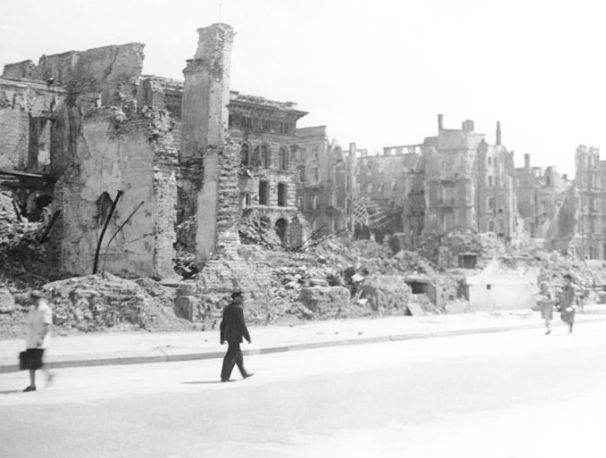
Wikimedia Commons
The war caused also more than 20 million refugees and massive migration flows. Eight million Germans tried to reach the territory occupied by the Americans or the British to avoid the Soviet occupation. On the other hand, millions had been forced to work in Germany during the war, or were war prisoners; all of them wanted to come back home.
Devastation was also a common result of the war. Most of the transport networks or industrial structures were destroyed, above all in Germany, France or Western USSR. Around 25 million people lost their homes.
b) The organization of peace. The end of the war was not followed by a general peace agreement, due to the differences between the USSR and its formal allies. Instead, different peace treaties were signed. The organization of peace was sketched in three meetings of the leaders of the Grand Alliance (USSR, USA and Great Britain), even before the end of the war. In November 1943 Stalin, Roosevelt and Churchill met at Tehran to decide the American-British invasion of Normandy. This implied the fact that Eastern Europe would be liberated by Soviet troops, and that Germany would be divided after the defeat of Hitler.
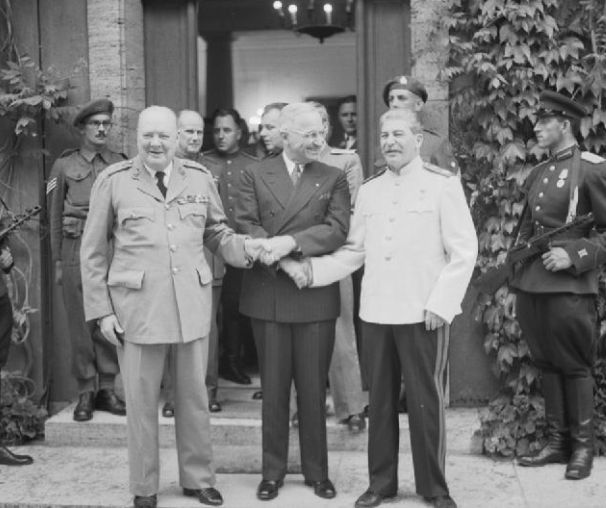
Wikimedia Commons
In February 1945 the three leaders met again in Yalta. Discussions focused on the opening of a second front against Japan by the Soviets and the creation of the United Nations Organization. On the other hand, it was agreed that Germany would be divided into four occupation zones. The USSR would keep its influence over the occupied territories of Eastern Europe but the governments of the liberated countries would be freely elected.
A new conference was held at Potsdam in July 1945, after the defeat of Germany. The new American president, H. Truman, who had succeeded Roosevelt, hardened his position with respect to the USSR. He called for free elections in Eastern Europe, something that Stalin was not willing to accept. It was the beginning of the Cold War. The Eastern part of Germany was occupied by the Soviets, and the USA, Great Britain and France took over the other sectors. Berlin remained under the control of the four powers.
1. The Cold War
a) Concepts
-The origins. The origin of the Cold War was the consequence of the differences between the USSR and the USA at the end of the war. As a matter of fact, the Soviets supported the access to power of the communist parties in the countries of Eastern Europe. Even when free elections were allowed (like in Hungary), the communists controlled the government. Only Yugoslavia, under marshal Tito, resisted the interferences of Moscow.
President Truman responded to the communist movements in Greece and Turkey with a declaration before the American Congress -the Truman Doctrine, enunciated on 12 March 1947. Truman initiated a policy of containment of communism through economic and military support against the expansion of the Soviet influence. In 1947, secretary of State George Marshall proposed a recovery plan to help the European economies, devastated by the war. The Marshall Plan constituted a capital flow of 13 billion dollars that was rejected by the countries under the Soviet sphere of influence.
TRUMAN ADDRESS BEFORE THE CONGRESS. MARCH 12, 1947
The gravity of the situation which confronts the world today necessitates my appearance before a joint session of the Congress. The foreign policy and the national security of this country are involved.
One aspect of the present situation, which I wish to present to you at this time for your consideration and decision, concerns Greece and Turkey. (.) The very existence of the Greek state is today threatened by the terrorist activities of several thousand armed men, led by Communists, who defy the government's authority at a number of points, particularly along the northern boundaries (.) Turkey now needs our support.
(.) The peoples of a number of countries of the world have recently had totalitarian regimes forced upon them against their will. The Government of the United States has made frequent protests against coercion and intimidation, in violation of the Yalta agreement, in Poland, Rumania, and Bulgaria. I must also state that in a number of other countries there have been similar developments.
At the present moment in world history nearly every nation must choose between alternative ways of life. The choice is too often not a free one.
One way of life is based upon the will of the majority, and is distinguished by free institutions, representative government, free elections, guarantees of individual liberty, freedom of speech and religion, and freedom from political oppression.
The second way of life is based upon the will of a minority forcibly imposed upon the majority. It relies upon terror and oppression, a controlled press and radio; fixed elections, and the suppression of personal freedoms.
I believe that it must be the policy of the United States to support free peoples who are resisting attempted subjugation by armed minorities or by outside pressures.
I believe that we must assist free peoples to work out their own destinies in their own way.
I believe that our help should be primarily through economic and financial aid which is essential to economic stability and orderly political processes.
(.) We must take immediate and resolute action. (.) The seeds of totalitarian regimes are nurtured by misery and want. They spread and grow in the evil soil of poverty and strife. They reach their full growth when the hope of a people for a better life has died. We must keep that hope alive.
As an alternative, in 1947 the Molotov Plan offered Soviet aid, and in 1949 the USSR created the COMECON (Council for Mutual Economic Assistance). Besides, the Kominform organized the coordination between the European communist parties (included the Italian and the French) under the direction of Moscow.
RESOLUTION ADOPTED BY THE MEETING OF THE COMMUNIST INFORMATION BUREAU. 1949
The preparations for a new war carried out by the Anglo-American imperialists, the crusade of bourgeois reaction against the democratic rights and the economic interests of the working class and the mass of the people call for intensified struggle of the working class to maintain and consolidate peace and to organize a resolute rebuff to the warmongers and the onslaught of imperialist reaction. Unity in the ranks of the working class is a guarantee of success in this struggle (.) Never before in the history of the international working class movement has the unity of the working class, both within individual countries and on a world scale, been of such decisive significance as at the present time. Unity of the working class is essential to safeguard peace; to frustrate the criminal designs of the warmongers; to foil the conspiracy of the imperialists against democracy and Socialism; to prevent the establishment of fascist methods of domination; resolutely to rebuff the crusade of monopoly capital against the vital interests of the working class and to secure an improvement in the economic conditions of the working masses. The realization of these tasks can be achieved, above all, on the basis of rallying the broad mass of the working class, irrespective of party affiliation, trade union organization or religious convictions. Unity from below -such is the most effective way to consolidate all forces of the workers to defend peace and the national independence of their countries and to defend the economic interests and democratic rights of all working people.
(.) On the direct orders of U.S. and British imperialists, the Right-Wing Socialist and reactionary trade union leaders split the ranks of the working class movement from above, seeking to destroy united working class organizations created in the postwar period. In those countries where Right-Wing Socialists are in the Government (Britain, France, Austria and the Scandinavian countries), they emerge as ardent champions of the "Marshall Plan," "Western Union," the "North Atlantic Agreement" and of all other forms of U.S. expansion. These pseudo-Socialists perform a foul role in persecuting the working class and democratic organizations which defend the interests of the working people (.) having completely abandoned the Marxist doctrine (.)
The Information Bureau is of the opinion that on the basis of working class unity it is essential to achieve national unity of all democratic forces, to mobilize the broad masses of the people for the struggle against Anglo-American imperialism and reaction at home. /p>
-Two blocks. The Cold War meant the division of the world into two main social, economic and political areas (communist and capitalist) led by one of the two superpowers. In other words, it implied the creation of a bipolar world. In Europe, Winston Churchill declared that an "iron curtain" divided the continent: on the one side, Western and capitalist countries; on the other, the territories occupied by the Red Army, which soon became popular democracies or communist States. In 1949 NATO (North Atlantic Treaty Organization) was created by the USA and their Western allies as an instrument of collective defence against the Soviet block (it provided mutual assistance if one of the allies were attacked). When West Germany was admitted in 1955, the USSR created the Warsaw Pact as a military alliance of the communist countries against NATO.
Germany was a good example of the division of the European continent. In 1948 the USA, Great Britain and France agreed to merge their respective occupation zones, as a first step to create a new German State. Stalin decided to keep the Soviet zone separated. When the Western powers introduced a new currency in West Berlin, Stalin closed all means of transport and isolated this part of the city. This blockade failed because an airlift provided the Western part of the capital with the necessary supplies. This consolidated the division of Germany into the Federal Republic (West Germany) and the Democratic Republic (East Germany) in 1949.
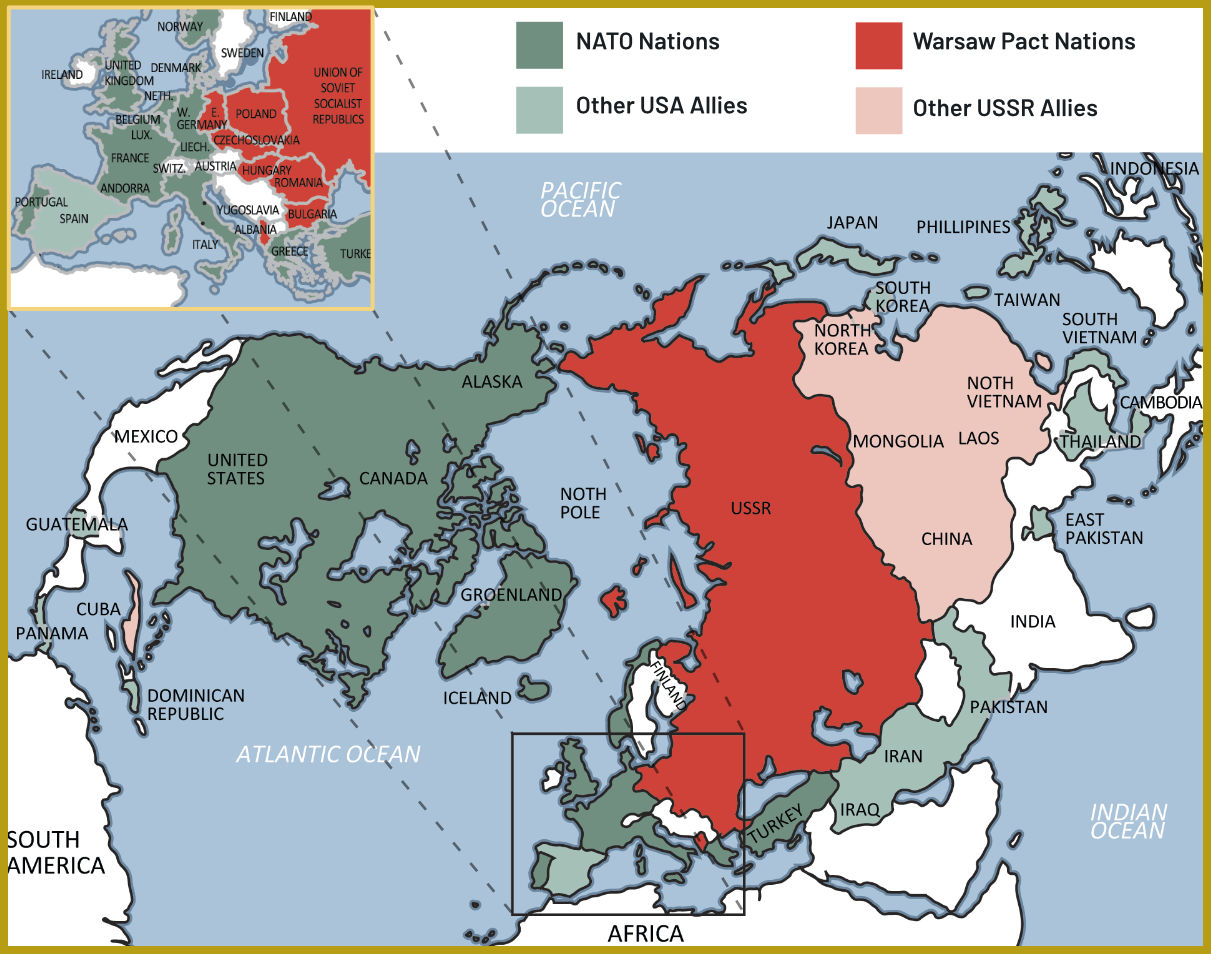
-Cold war, hot wars. As a matter of fact, in spite of the military contest between the two blocks, the Cold War never became a USSR-USA direct confrontation. The atomic bomb, used by the Americans against Japan, was successfully tested by the Soviets in 1949. The proliferation of nuclear weapons within a new arms race was the following step. Notwithstanding, the risk of a world total destruction was precisely the main obstacle for an open and generalized conflict.
Instead of a war between the two superpowers, a number of local "hot" conflicts took place in the context of the Cold War. One of them was the Korean War. At the end of WWII, along the 38º parallel, Korea was divided into the communist North and the capitalist South. In 1950 North Korean soldiers crossed the parallel and took Seoul. With a UN mandate, the USA led a military force that rejected the North Korean army. Only the support of the Chinese government could stop the Americans, and the 38º parallel became again the border of a divided country.
b) The time of coexistence and the Vietnam War
-The speech at the 20th Party Congress. After the death of Stalin, Nikita Kruschev criticized the excesses of the former Soviet government and call for a peaceful coexistence with the West in his speech at the 20th Congress of the Soviet communist party. As a result, a treaty on Austria was signed in 1955 in order to put an end to the presence of occupation forces and to create a neutral country.
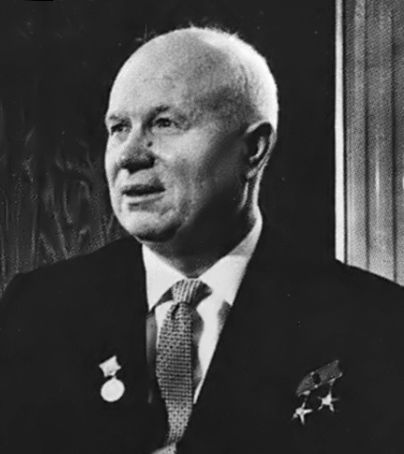
Wikimedia Commons
SECRET SPEECH DELIVERED BY N. KRUSCHEV AT THE 20TH PARTY CONGRESS OF THE COMMUNIST PARTY OF THE SOVIET UNION, FEBRUARY 25, 1956
(.) Allow me first of all to remind you bow severely the classics of Marxism-Leninism denounced every manifestation of the cult of the individual. (.) Marx stated: "From my antipathy to any cult of the individual (.)
During Lenin's life the central committee of the party- was a real expression of collective leadership of the party and of the Nation. Being a militant Marxist-revolutionist, always unyielding in matters of principle, Lenin never imposed by force his views upon his coworkers. He tried to convince; he patiently explained his opinions to others. Lenin always diligently observed that the norms of party life were realized, that the party statute was enforced, that the party congresses and the plenary sessions of the central committee took place at the proper intervals.
(.) Stalin acted not through persuasion, explanation, and patient cooperation with people, but by imposing his concepts and demanding absolute submission to his opinion. Whoever opposed this concept or tried to prove his viewpoint, and the correctness of his position-was doomed to removal from the leading collective and to subsequent moral and physical annihilation. This was especially true during the period following the 17th party congress, when many prominent party leaders and rank-and-file party workers, honest and dedicated to the cause of communism, fell victim to Stalin's despotism.
(.) Stalin, on the other hand, used extreme methods and mass repressions at a time when the revolution was already victorious, when the Soviet state was strengthened, when the exploiting classes were already liquidated, and Socialist relations were rooted solidly in all phases of national economy, when our party was politically consolidated and had strengthened itself both numerically and ideologically. It is clear that here Stalin showed in a whole series of cases his intolerance, his brutality, and his abuse of power. Instead of proving his political correctness and mobilizing the masses, he often chose the path of repression and physical annihilation, not only against actual enemies, but also against individuals who had not committed any crimes against the party and the Soviet Government.
(.) It was determined that of the 139 members and candidates of the party's Central Committee who were elected at the 17th congress, 98 persons, that is, 70 percent, were arrested and shot (mostly in 1937-38) (.) The same fate met not only the central committee members but also the majority of the delegates to the 17th party congress. Of 1,966 delegates with either voting or advisory rights, 1,108 persons were arrested on charges of anti-revolutionary crimes, i.e., decidedly more than a majority. This very fact shows how absurd, wild, and contrary to commonsense were the charges of counter-revolutionary crimes made out, as we now see, against a majority of participants at the 17th party congress.
-The limits of coexistence. In spite of this, the Soviets kept a strict control over their satellites: in 1956, a massive movement against the communist government in Hungary was crushed by Russian troops. In 1961, a wall was built in Berlin to prevent East Berliners escaping to the West (3 million had done so since the end of the war). In 1968, an attempt of the Czechoslovakians to reform their political system (the Prague Spring) led to another military intervention of the Warsaw Pact.
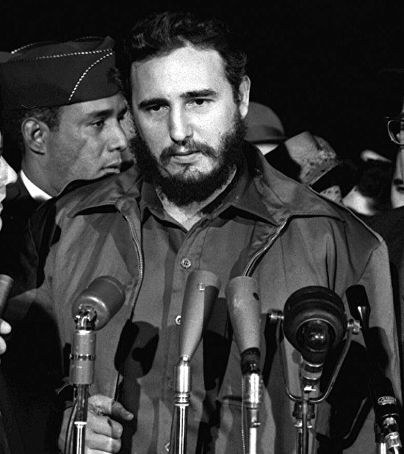
Wikimedia Commons
The Cuban missiles crisis showed the real limits of coexistence. In 1959 Fidel Castro had deposed the pro-American dictator Batista; the new government soon accepted the Soviet support and broke off its relationship with the USA. The situation became rapidly a cold-war confrontation: president J. F. Kennedy backed a failed plan to invade Cuba at the Bay of Pigs, Castro declared the island a socialist country, and Kruschev decided to install nuclear missiles able to reach the main American cities from Cuba. It was one of the tensest situations of the Cold War, since Kennedy ordered a naval blockade of Cuba and sent the Navy to prevent the Soviet fleet from bringing the missiles. A direct confrontation came dangerously close to a nuclear war. Finally, Kruschev ordered the Soviet ships to come back and Kennedy agreed to preserve Cuban sovereignty.
The result of the Cuban crisis was to improve the relationship between the two superpowers: the "hot-line" or direct phone communication between Washington and Moscow was established to solve future crisis; an agreement was reached on a nuclear test ban treaty. Nevertheless, the nuclear race continued and new crisis arose, such as the Vietnam War.
-The Vietnam War. Vietnam was part of French Indochina. After the end of WWII the Vietminh, a guerrilla that had fought against the Japanese occupation and led by the communist Ho Chi Minh, now resisted the French. In 1954 the country was also divided into a communist and a capitalist zone. Then the USA decided to support the South Vietnamese against the Northern communists within a clear cold-war context. The American involvement increased in financial and military terms, as the communist intervention and the guerrilla or Vietcong strengthened their influence in the South. Actually, in spite of having deployed around 500.000 troops in the area, the American intervention failed and president Nixon ordered the withdrawal since 1973. In 1975 Saigon, the Southern capital, was occupied by the Vietcong and the North Vietnamese army: Vietnam became a united country.
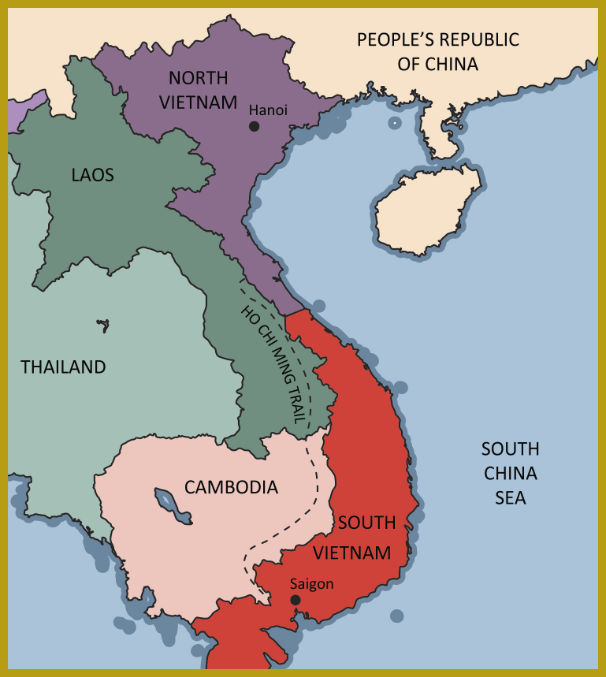
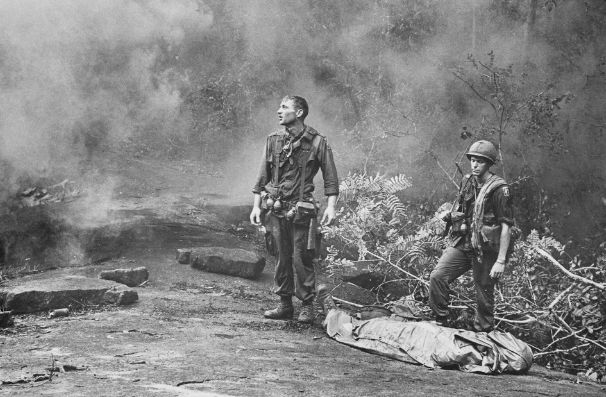
Wikimedia Commons
c) The détente
In the early 70s the superpowers tried again to achieve a peace settlement and to diminish the risk of a nuclear confrontation. This was called the "détente". New nuclear weapons had been added to the American and Soviet arsenals and could destroy the world many times3. On the communist side, the USSR realized that its economic structure could not support the financial requirements of the arms race; on the other hand the relationship between Moscow and Beijing worsened, so both countries were eager to negotiate with the Americans to strengthen its own position. On the other side, the USA were weakened by their failure in Vietnam, and were looking for a strategy different from confrontation.
As a result, the SALT I (Strategic Arms Limitation Talks) Treaty was signed in 1972. The objective for the Americans was the principle of equivalence, or equal nuclear power for both superpowers as a means to avoid a nuclear war. In 1975 the Helsinki Accords were signed by the USA, the USSR and European countries of both sides. They formally acknowledged the European borders established since WWII and stressed the importance of the protection of human rights.
Nevertheless, in fact the détente was followed by an increase of nuclear arsenals. President Carter failed to obtain the approval of the Congress for the SALT II Treaty, signed in 1979. New president R. Reagan started a new program called the Strategic Defence Initiative (Star Wars), aimed to destroy ballistic missiles in flight. He also supported the rebels in Afghanistan, which had been invaded by the Soviets in 1979.
2. The United Nations Organization
After WWII, the UN was created to replace the League of Nations. Based on the proposals of China, USA, USSR and Great Britain (the Dumbarton Oaks meeting), the Conference held in San Francisco in 1945 decided to agree on the principles of its foundational Charter.
The objectives of the UN are: 1, to maintain international peace and security; 2, to promote economic, social and cultural development; 3, to protect human rights and to safeguard the rights of peoples and nations.
The structure of the UN is based on the General Assembly, the Security Council, a Secretariat, the International Court of Justice, the International Criminal Court and the Economic and Social Council.
Charter of the United Nations
Article 2
The Organization and its Members, in pursuit of the Purposes stated in Article 1, shall act in accordance with the following Principles. The Organization is based on the principle of the sovereign equality of all its Members.
1. All Members, in order to ensure to all of them the rights and benefits resulting from membership, shall fulfill in good faith the obligations assumed by them in accordance with the present Charter.
2. All Members shall settle their international disputes by peaceful means in such a manner that international peace and security, and justice, are not endangered.
3. All Members shall refrain in their international relations from the threat or use of force against the territorial integrity or political independence of any state, or in any other manner inconsistent with the Purposes of the United Nations.
4. All Members shall give the United Nations every assistance in any action it takes in accordance with the present Charter, and shall refrain from giving assistance to any state against which the United Nations is taking preventive or enforcement action.
5. The Organization shall ensure that states which are not Members of the United Nations act in accordance with these Principles so far as may be necessary for the maintenance of international peace and security.
6. Nothing contained in the present Charter shall authorize the United Nations to intervene in matters which are essentially within the domestic jurisdiction of any state or shall require the Members to submit such matters to settlement under the present Charter; but this principle shall not prejudice the application of enforcement measures under Chapter VII.
The General Assembly, based in New York, is the representative and deliberative institution of the UN. It is composed of all member States, under the principle of one vote per member. Decisions are taken by majority, although for some specific issues (admittance or expulsion of members, actions of peace maintenance) a two-thirds majority is needed. Its recommendations are not binding for all members.
The Security Council, based also in New York, is the permanent institution of the UN in charge of the maintenance of peace. Its resolutions are binding for all members. Since 1965 the Council is composed of 15 members, 5 permanent (USA, USSR -afterwards Russia, France, China, and Great Britain), and 10 non-permanent, elected by the Assembly. Decisions need 9 votes in favour, but only without the veto of one of the 5 non-permanent members. Nevertheless, the General Assembly introduced the resolution Uniting for Peace in 1950, declaring that in case of veto against a Council resolution, the Assembly could decide in 24 hours about the appropriate measures to take, including military intervention. As a matter of fact, the right of veto has limited in a number of cases the potential actions of the UN.
The Secretariat, with 50.000 employees, carries out the administrative work of the UN. The Secretary-General, appointed by the Assembly for 5 years on the recommendation of the Council, is the spokesman of the Organization and head of the Secretariat.
The International Court of Justice is composed of 15 judges elected for 9 years by the Assembly and the Council jointly. Based in the Hague, it decides on disputes between States, but only when both parties agree to accept the verdict. Actually, the Court has been successful in certain cases, but not in others, because it has no power to enforce its own judgements.
The International Criminal Court began its activities concerning the judgement of international crimes (war crimes, genocide, crimes against humanity) in 2003 in the Hague. Nevertheless, the US government, after having signed the Rome Statute of 1998, refused to recognize the Court.
The Economic and Social Council (ECOSOC) has 27 members elected by the Assembly, and promotes social and economic cooperation and development through the implementation of projects. It also coordinates other specialized agencies, such as the ILO (International Labour Organization), the WHO (World Health Organization), the FAO (Food and Agriculture Organization), the UNESCO (UN Educational, Scientific and Cultural Organization), or the UNICEF (UN Children's Fund).
The intervention of the UN in some international disputes has been successful. For example, when North Korea invaded the South, the UN supported a military intervention (authorized by the Council only thanks to the absence of the Russian delegate); more recently, when Saddam Hussein occupied Kuwait in 1990, international troops under the mandate of the UN liberated the emirate. Nevertheless, other actions of the UN have failed. The UN has been unable to solve the Palestine conflict and to stop the successive Israeli-Arab wars, to provide a solution for the Turkish-Greek confrontation in Cyprus, to prevent the continuation of the civil war in Somalia, or to lead (or to impede) the intervention that in 2003 British and American troops undertook in order to overthrow Saddam Hussein.
3. The end of empires and decolonisation
a) Factors
. Nationalist movements. Even before WWII, native nationalist groups spread in colonized countries. These groups were led by persons educated at the Universities of the metropolis, thus perfectly able to underline the cultural values of their countries of origin (the concept of négritude in French Africa) and to create structured political movements (the Indian National Congress, created in 1885).
. World War II. Large colonial territories were occupied by the Axis powers. On the one hand, national resistance to new invaders continued against the metropolis after the end of the War (as the Viet Minh did against the Japanese and the French). On the other, war efforts and devastation weakened the position of the imperial powers.
. The bipolar world. Both the USSR and the USA disliked the continuation of the colonial empires.
. The principle of self-determination of peoples. One of the purposes of the United Nations is to develop friendly relations among nations based on respect for the principle of equal rights and self-determination of peoples (art. 1. 2 of the Charter).
b) Asia
During the interwar period, Great Britain had granted a limited Indian self-government. But after WWII the two main political parties, the Indian National Congress (Hindu, founded in 1885) and the Muslim League (founded in 1906) asked for independence. Fearing a minority position in the new India, the Muslims demanded a separate State. On the contrary, the Hindu leaders Jawaharlal Nehru and Mohandas (Mahatma or Big Soul) Gandhi were in favour of a unified India.
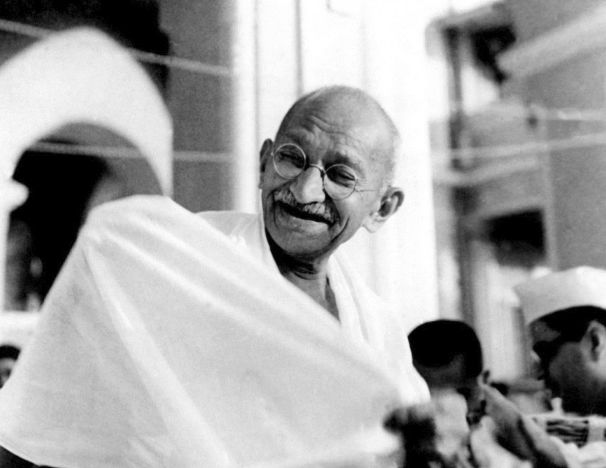
Wikimedia Commons
In 1947 India became an independent country, but it was divided into two States: Muslim West and East (Bangla Desh) Pakistan, and India. Violence accompanied the partition, and ten million people migrated to one or the other territory. Immediately an open war broke out between the two new States for the possession of Kashmir in the North. Because of his non-violent position and his opposition to separatism, Gandhi was murdered by a radical Hindu in 1948. Nowadays the conflict between India and Pakistan remains active, since both countries possess nuclear weapons.
Other metropolis did not accept to leave their colonies. The Dutch army intervened in Indonesia to restore imperial rule; although formal independence was conceded in 1949, a truly independent Republic was not created but in 1960. A military conflict between the colonial power and nationalists took place also in French Indochina, where Ho Chi Minh declared the independence of Vietnam after the Japanese defeat in 1945. Subsequent French intervention ended in the victory of the Vietminh at the battle of Dien Bien Phu, the withdrawal of the French troops and the division of the country.
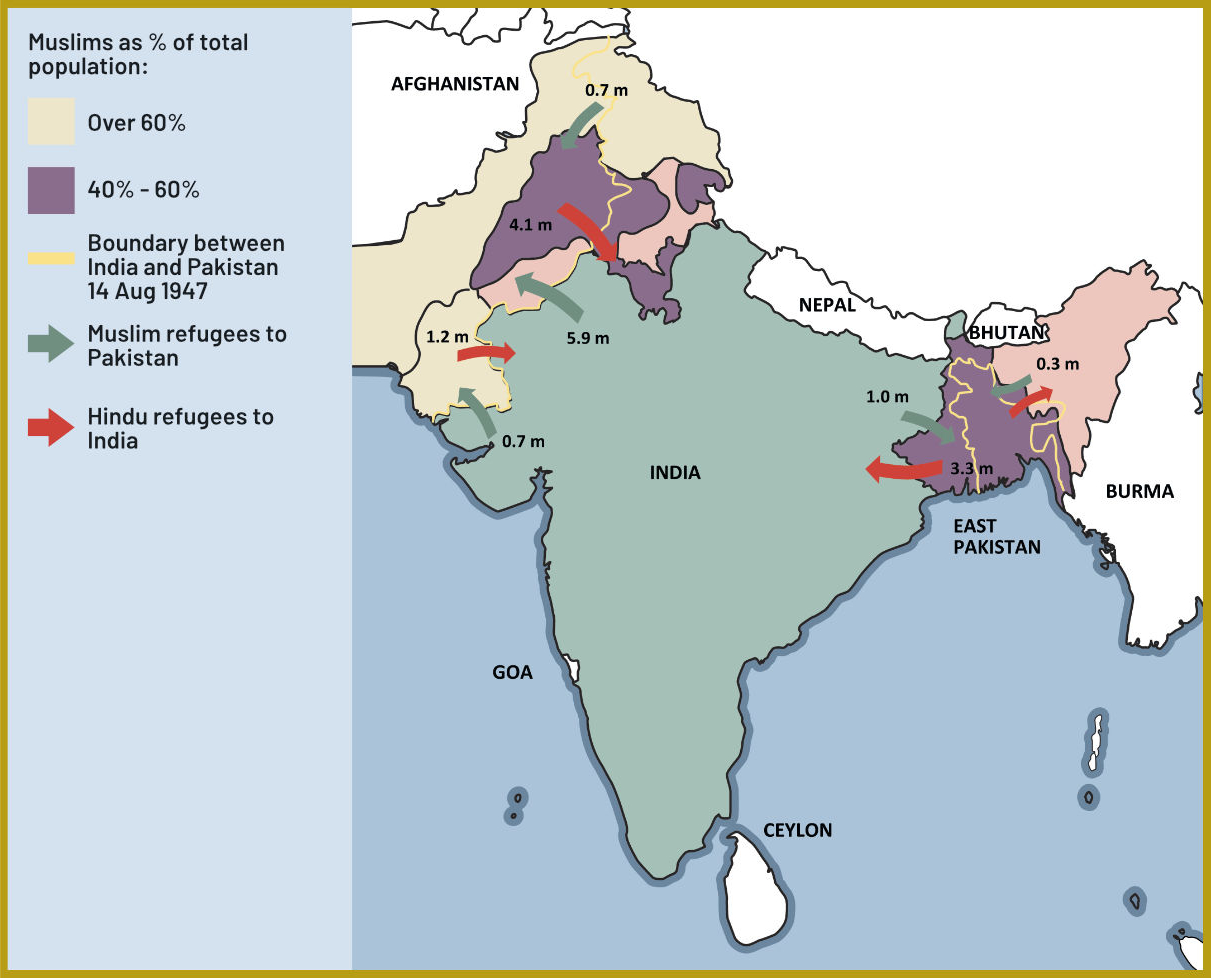
c) Africa
France was determined to keep control over Algeria. Two million French settlers (the pied-noirs) supported the colonial rule against the nationalist Front de Libération Nationale (FNL), which adopted guerrilla tactics. Although France sent 500.000 soldiers to Algeria, a long war took place and the country only acceded to independence in 1962. Since France needed to focus on Algeria, other North African countries obtained it earlier: Morocco and Tunisia became independent in 1956.
In Sub-Saharan Africa, Ghana started the process in spite of the British repression against the nationalist movement led by Kwame Nkrumah: the country was granted independence in 1957. Nkrumah supported the idea of African unity as an instrument for political independence and economic development.
For centuries, Europeans dominated the African continent. The white man arrogated to himself the right to rule and to be obeyed by the non-white; his mission, he claimed, was to "civilise" Africa. Under this cloak, the Europeans robbed the continent of vast riches and inflicted unimaginable suffering on the African people.
(.) It is clear that we must find an African solution to our problems, and that this can only be found in African unity. Divided we are weak; united, Africa could become one of the greatest forces for good in the world.
Although most Africans are poor, our continent is potentially extremely rich. Our mineral resources, which are being exploited with foreign capital only to enrich foreign investors, range from gold and diamonds to uranium and petroleum. Our forests contain some of the finest woods to be grown anywhere. Our cash crops include cocoa, coffee, rubber, tobacco and cotton. (.) This is one of the reasons why we have in Africa the paradox of poverty in the midst of plenty, and scarcity in the midst of abundance.
(.) There are at present some 28 states in Africa, excluding the Union of South Africa, and those countries not yet free. No less than nine of these states have a population of less than three million. Can we seriously believe that the colonial powers meant these countries to be independent, viable states? The example of South America, which has as much wealth, if not more than North America, and yet remains weak and dependent on outside interests, is one which every African would do well to study.
(.) The greatest contribution that Africa can make to the peace of the world is to avoid all the dangers inherent in disunity, by creating a political union which will also by its success, stand as an example to a divided world. A Union of African states will project more effectively the African personality. It will command respect from a world that has regard only for size and influence.
(.) We have to prove that greatness is not to be measured in stock piles of atom bombs. I believe strongly and sincerely that with the deep-rooted wisdom and dignity, the innate respect for human lives, the intense humanity that is our heritage, the African race, united under one federal government, will emerge not as just another world bloc to flaunt its wealth and strength, but as a Great Power whose greatness is indestructible because it is built not on fear, envy and suspicion, nor won at the expense of others, but founded on hope, trust, friendship and directed to the good of all mankind.
The emergence of such a mighty stabilising force in this strife-worn world should be regarded not as the shadowy dream of a visionary, but as a practical proposition, which the peoples of Africa can, and should, translate into reality. There is a tide in the affairs of every people when the moment strikes for political action. Such was the moment in the history of the United States of America when the Founding Fathers saw beyond the petty wranglings of the separate states and created a Union. This is our chance. We must act now. Tomorrow may be too late and the opportunity will have passed, and with it the hope of free Africa's survival.
Kwame Nkrumah, I Speak of Freedom:
A Statement of
African Ideology, 1961
The case of Kenya was not as peaceful. White settlers and nationalists (especially the Kikuyu, who created a secret society called Mau-Mau) became involved in a violent conflict. The British government sent troops against the Kikuyu and imprisoned the nationalists like Jomo Kenyatta. Nevertheless, in spite of its military victories, the British were not able to maintain a white political and social domination, and consequently allowed the formation of free political parties, one of them headed by Kenyatta. This led to the independence of the country in 1963.
In 1960, thirteen French colonies in Africa acquired their independence, as well as the Congo from Belgium. But in the Congo different groups started a violent confrontation for the control of the country, and finally the democratic government was deposed by general Mobutu in 1965. As a matter of fact, civil struggles in the Congo persist nowadays.
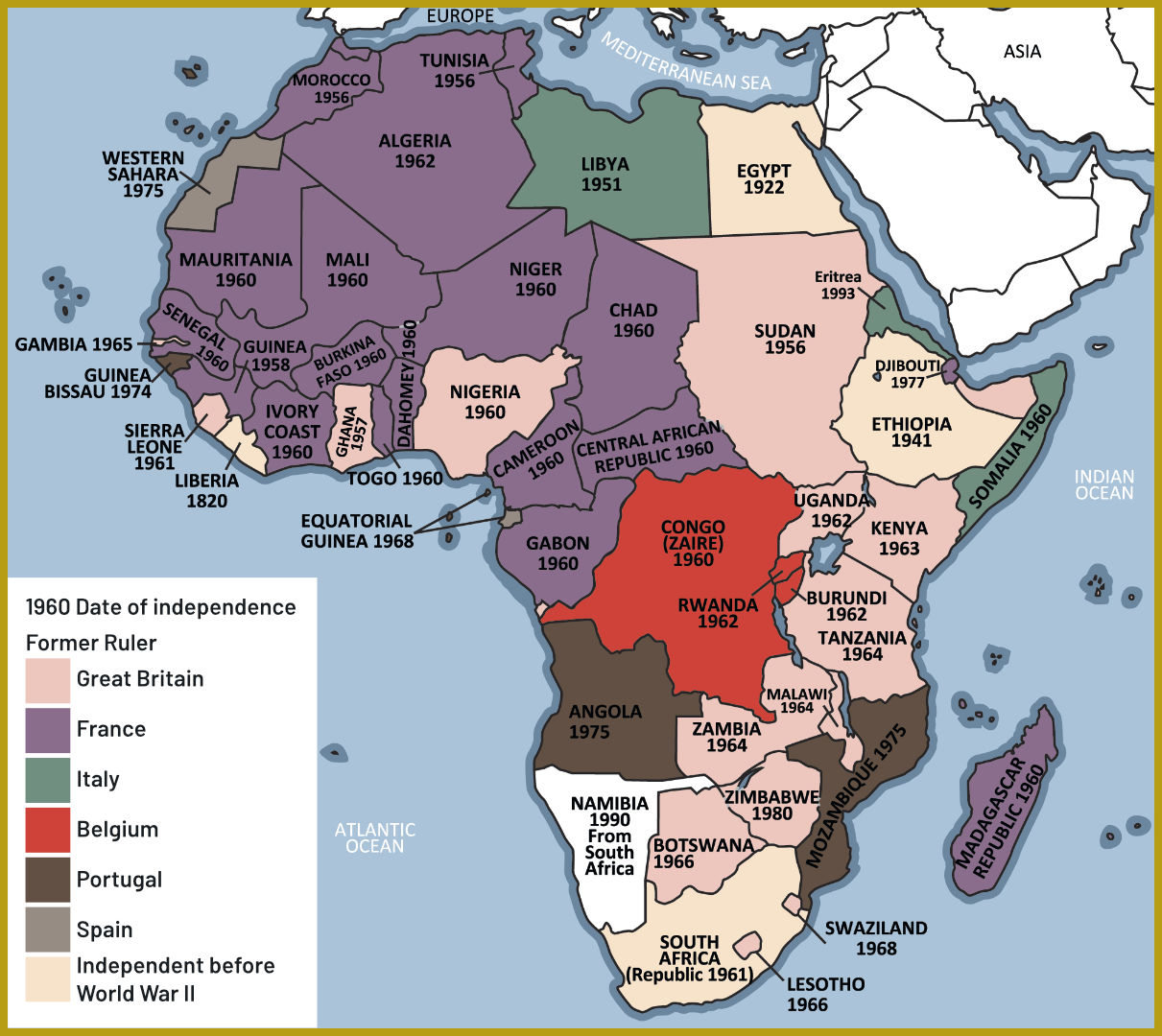
c) Arab nationalism. The State of Israel
Before WWII, only Egypt enjoyed an autonomous administration. After the War, Arab States became fully independent (Egypt, Syria, Irak, Lebanon, Jordan). Nevertheless, the major source of conflict came from the creation of the State of Israel. The Zionist movement sought to re-create a Jewish homeland in Palestine since the 19th century. Migration became stronger under the British mandate (especially after the persecution of Jews in Europe and the Holocaust), and as a result conflicts between Jewish settlers and the Arab Palestinian population increased.
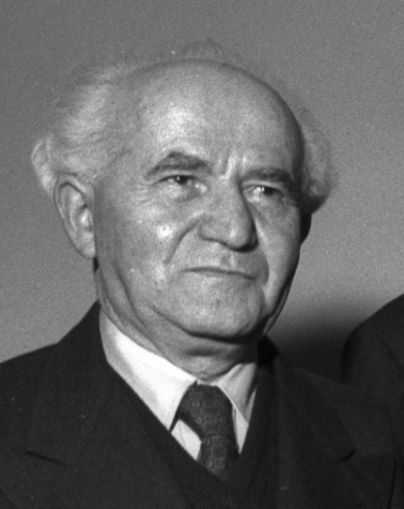
Wikimedia Commons
In 1947 the UN proposed a plan for the division of the region into two separate States, Arab and Jewish. Since the Arabs rejected the plan, Great Britain withdrew, and the Jew leader David ben Gurion proclaimed the State of Israel (1948). Immediately the Arab States declared the war, but the Israeli troops rejected the combined Arab forces and defeated them. After three more wars, Israel consolidated its position in spite of the hostility and opposition of the Arab world.
